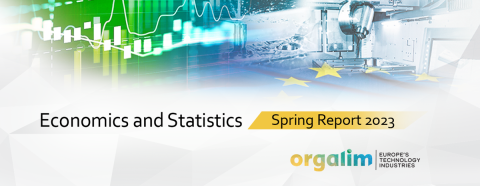No time for complacency: Orgalim’s economic outlook underscores competitiveness threat
16 May 2023

At a time when Europe has put industry at the core of its net zero ambition, its high-tech manufacturing base still faces multiple challenges and the prospect of negative growth this year, Orgalim's latest economic outlook warns.
After adjusting for inflation, our Spring Economics & Statistics Report forecasts a 2.3% decline in 2023 real turnover for Europe’s technology industries, which between them account for a third of EU manufactured exports. This is below most expectations for the European economy as a whole. While there are bright spots in parts of Europe, there are clear warning signs for the manufacturing sectors in Europe as a whole. Of particular concern: real investment in our industries fell more than 3% in 2022 and is expected to slump further in 2023.
“Orgalim’s latest economic forecasts underline the extent and the urgency of the competitiveness threat facing Europe’s manufacturing base,” said Malte Lohan, Orgalim Director General. “The EU’s determination to boost industrial competitiveness is welcome, but it is failing so far to address the structural issues confronting our companies, not least the cost pressures related to energy, labour and regulatory burdens. This is no time for complacency.”
Orgalim’s latest economic forecasts underline the extent and the urgency of the competitiveness threat facing Europe’s manufacturing base. This is no time for complacency.
Although the worst fears of a winter energy crisis did not materialise and supply shortages are easing, energy prices remain high and Orgalim economists point to creeping unit labour costs in manufacturing as another indicator of the erosion of industry competitiveness in the Euro zone. Additionally, Orgalim members indicate that the tight employment market continues to limit growth potential, even as a global decline in industrial demand begins to bite.
The report also highlights the importance of improving the underlying investment conditions in Europe. Notwithstanding the unprecedented focus on public subsidies for Europe’s green and digital transition, private investment in critical high-tech manufacturing sectors is suffering. Adjusted for inflation, investment in our industries is expected to fall by 7.5% in 2023.
“The reasons for this are clear,” said Martin Baminger, Chair of Orgalim’s Economics & Statistics Working Group. High uncertainty about the global economic business trend and the growing regulatory burden in Europe is making companies cautious when it comes to investment planning, he said. “Profitability has decreased in large parts of our sectors, which means that there are significantly fewer funds available for investment.”
Orgalim’s biannual Economics & Statistics report is based on member economic data covering the mechanical engineering, electrical engineering, electronics ICT and metal technology branches in the EU plus Switzerland. The Autumn outlook is due to be published in November.
Read the full report on the Orgalim website here and our key figures here.
For more on Orgalim’s views on EU industrial strategy and competitiveness:

LATEST NEWS
How can we create a dynamic, competitive European high-tech manufacturing base?
Orgalim's key recommendations offer policymake...
